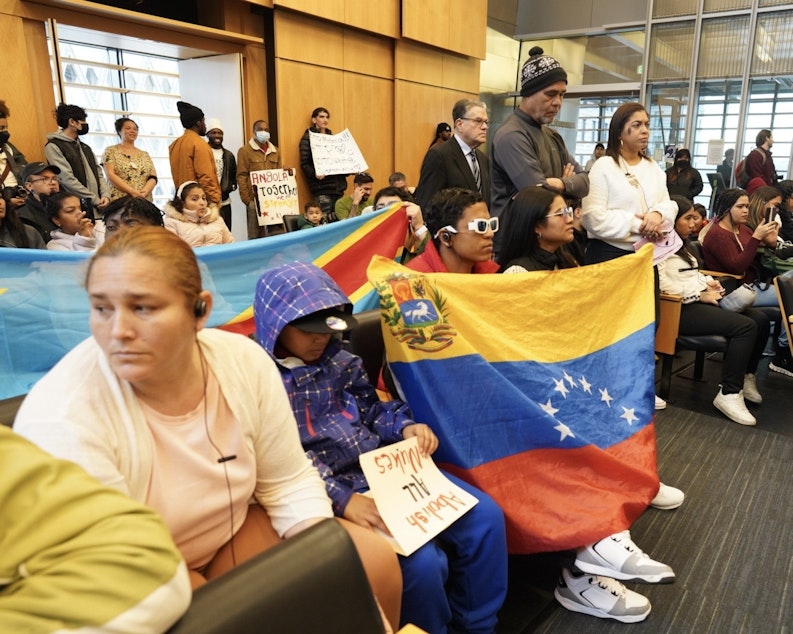Time, money runs low for asylum-seekers sheltering at Seattle area hotels

Hundreds of asylum-seekers took refuge at Seattle area hotels during January’s cold snap. What was intended to be a weeklong stay has evolved into a monthlong stay.
The temporary lodging is welcomed, but these migrants — for whom permanent shelter and immigration resources remain elusive — could wind up back on the street and in tent encampments this week.
A
driana Figueira and other asylum-seekers staying at the Sleep Inn Hotel in Sea-Tac are used to the sounds and chaos of moving. They’ve been bouncing from place to place for a long time, even before arriving in the Seattle area.
Community organizers with Comunidad sin Fronteras, including Figueira, have managed to get roughly 200 people into hotels — a fourth of them children — for about a month with the help of other community groups, local governments, and the state. Comunidad sin Fronteras also raises funds through its social media accounts.
But time and money are running out.
Staying at the Sleep Inn costs $70 per night for each of the 59 rooms the asylum-seekers occupy. Over the span of 19 days, that adds up to more than $78,000 before taxes, fees, and tips, and is mostly paid by the city of Seattle. The migrants didn’t come looking for handouts though, Figueira said — just a leg up as they await the outcomes of their immigration cases. She has a hearing in April with the United States Citizenship and Immigration Services.
"What we really want is for people to support us,” Figueira said in Spanish. “It's not an easy fight, but it's not impossible either."
Many of the migrants at the Sleep Inn come from Venezuela, where political unrest and economic turmoil — connected in part to U.S.-issued sanctions on the country — has incentivized many to come here and seek temporary protected status, asylum, or sometimes both at once.
Adriana Medina, an asylum-seeker and organizer with Comunidad sin Fronteras, said she and other migrants at the hotel want to avoid living in the U.S. undocumented or being deported. She also has a hearing with the United States Citizenship and Immigration Services in the spring.
“We want to do everything right,” Medina said in Spanish. “Let's get our legal papers, get our jobs — we want to have stable housing."
Both temporary protected status and asylum allow migrants to be “legally present” in the U.S. But asylum places people on a track to receive residency status; you can’t do that with temporary protected status.
When people apply for temporary protected status, they can immediately apply for work authorization. People who apply for asylum must wait five months before submitting a work authorization application, often exacerbating their lack of resources.
Navigating that bureaucracy after walking through jungles, deserts, riding trains, buses, and encountering saints and extortioners to get here is taxing, Medina and Figueira said. They still have many questions about how to navigate their immigration cases.
Migrants often think that once they get here, “things will go smoother,” Medina said.
“But no — then here comes another process,” Figueira added.
J
onathan Lutumba is a 24-year-old political refugee from Angola. After crossing the Atlantic and then following a path similar to Medina’s and Figueira’s, he’s found himself in the tree-lined suburbs of West Seattle. He’s often thinking about his mom — he goes weeks without being able to contact her.
Around him, other housemates who are also seeking asylum get ready for the day. Together, they’re with the community organizing group Movimiento Congolese Angolano. Through the group’s fundraising, Lutumba was able to retain a lawyer for his immigration case.
“That's the most difficult thing: I'm not only speaking for me, but for many of my friends,” he said.
Angola isn’t on the U.S. 's temporary protected status list. That means Jonathan could only apply for asylum, which also means he has to wait much longer for any work authorization. Having a lawyer as Jonathan does can improve one’s chances of being approved for asylum status. Jonathan is slated to have a court hearing for his case in January 2025.
In total, Lutumba said he will have to pay about $7,000 dollars for his case: $500 dollars upfront, and at every follow up visit with his lawyer, he has to bring another $300. Meeting with his lawyer on a bi-weekly basis would be ideal. But without a job to make those payments, he’s in a bind. He said the long wait for work authorization is what’s really dragging him and many other migrants down.
“I think I will have more security for my life...and a better opportunity to be able to help my family,” he said in Portuguese.
State and local governments often point to the federal government as being responsible for solutions that can help people like Lutumba, Figueira, and Medina. But for the time being, grassroots organizers, private businesses, and local municipalities are filling the gaps.
The King County Department of Community and Human Services plans to earmark $1 million from its homelessness budget for the migrants, but when that money would become available is up in the air. The agency did not respond to KUOW’s request for comment.
On the state level, lawmakers are considering budget proposals in the House and Senate that would respectively designate an additional $25.6 million over the next two years and about $5 million to go toward programs that can help migrants and asylum-seekers in Washington. Those numbers are likely to change before the final state budget is created.
In the meantime, the self-organizing asylum-seekers will continue to fundraise, ask for help, and run through cycles of housing insecurity as they navigate a complicated legal process.

